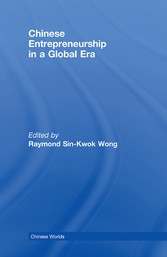
Chinese Entrepreneurship In A Global Era

von: Raymond Sin-Kwok Wong
Routledge, 2008
ISBN:
Sprache: Englisch
237 Seiten, Download: 1679 KB
Format: PDF, auch als Online-Lesen
5 Enterprise development and inter-ethnic relations in Malaysia (p. 91-92)
Affirmative action, generational change, and business partnerships
Edmund Terence Gomez
Affirmative action and the NEP
Following the racial riots of May 13, 1969, the Malaysian government implemented an ambitious 20-year social engineering plan in 1971 to achieve national unity. This plan, the New Economic Policy (NEP), sought to attain national unity by eradicating poverty, irrespective of race, and restructuring society so as to achieve inter-ethnic economic parity between the predominantly Malay Bumiputera (or ‘‘sons of the soil’’) and the predominantly Chinese non-Bumiputera. The government hoped to increase Bumiputera corporate equity ownership to 30 percent and reduce the poverty level to 15 percent by 1990. With the end of the NEP, the National Development Policy (NDP), building on the objectives of its predecessor, was implemented between 1991 and 2000.
The implementation of NEP entailed partial abandonment of the laissezfaire style of economic management. It favored greater state intervention, particularly for ethnic affirmative action, including an accelerated expansion of the Malay middle class, capital accumulation on behalf of the Malays, and the creation of Malay capitalists. The measures used to achieve these goals included requiring companies to restructure their corporate holdings to ensure at least 30 percent Bumiputera ownership and allotting publicly listed shares at par value or only nominal premiums to Bumiputeras. The government would subsequently encourage inter-ethnic business partnerships, as a means to promote ethnic coexistence as well as help advance the involvement of Malays in business.
This chapter focuses on two key but related issues. First, it provides a brief theoretical discussion on the evolution of business partnerships. Second, through an analytical tracing of the historical evolution of interethnic business relations in Malaysia, it offers some insights about the evolving nature of these inter-ethnic business ties, brought about through the implementation of NEP and NDP, in enterprise development, the newly emerged middle class, and ‘‘generational change’’ in Malaysia.
The main arguments can be briefly summarized as the following. First, although partnerships are common during business start-ups, they are not sustainable in the long run. In view of this, the Malaysian government’s policy of encouraging inter-ethnic business ties through business partnerships is not a proper mechanism to promote national unity. Second, changes in the nature of business relationships indicate that identity transformations have occurred in Malaysia with the rise of the middle class and as new generations of Malaysians emerge.
Development of Malaysian enterprise
Malaysian corporate history is replete with cases of business partnerships (for example, see Puthucheary 1960, Tan 1982, Sieh-Lee 1982, Hara 1993, Brown 1994, Searle 1999, and Gomez 1999). This history also indicates that the nature of business relationships is constantly evolving. When the Chinese first migrated to Malaya during the pre-colonial and colonial periods, intra-ethnic partnerships were common during the formation of businesses. Migrants saw common ethnicity as a tool they could exploit to help them cope with their new environment. Once acclimatized, however, they no longer had the same need (Benton and Gomez 2001).







